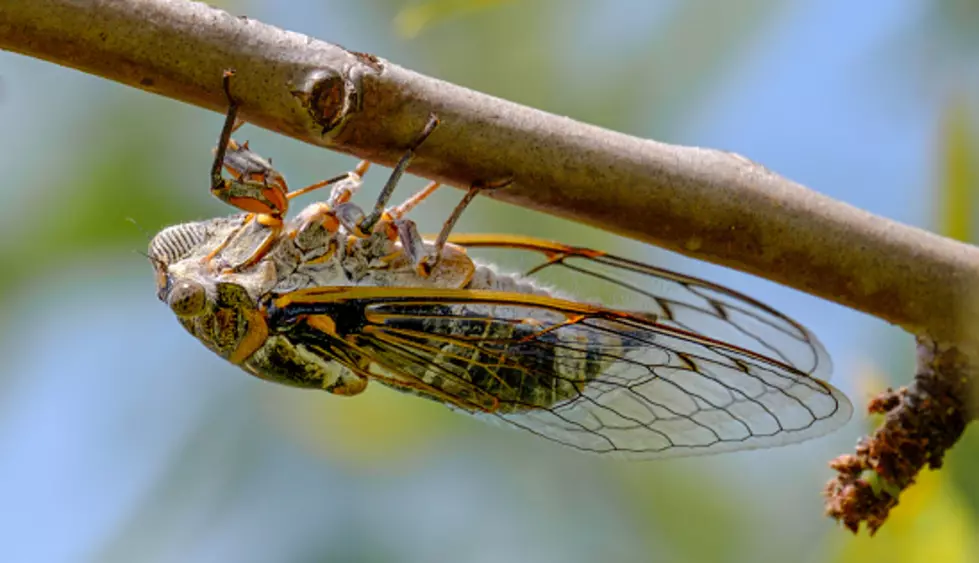
They’re Coming: Chicago Just Issued A Cicada Advisory
I'm fairly certain that by now, most everyone has heard about what's just about to happen here in Illinois.
If not, here it is in a nutshell:
The spring emergence this year of two cicada broods, Brood XIX and Brood XIII, will be the first time in 221 years that two broods have squirmed their out of the ground at the very same time. This emergence will result in billions, if not a trillion, noisy, pee-spraying, mating-obsessed cicadas showing up nearly everywhere in our state and several others.
At this point, we're just a few short weeks away from seeing it all happen.
Even Though We'll Be Seeing A Huge Influx Of Cicadas, Illinois Is Not Alone In Having To Deal With This Mass Emergence
In the northern part of the state, the aptly-named Northern Illinois Brood, or Brood XIII will be the cicadas that we'll get to see, hear, and even smell on an up-close and personal level. Residents of eastern Iowa, southern Wisconsin, and a narrow strip of Indiana bordering Lake Michigan and Michigan will also being seeing plenty of the Northern Illinois Brood soon.
Brood XIX, or the Great Southern Brood cicadas, have a more spread-out population, covering parts of Missouri, Illinois, Louisiana, North Carolina, Virginia and Maryland.
Experts seem to think that central Illinois, around Springfield, will be the overlap spot where both broods emerge at the same time.
Cicadas, No Matter The Brood, Don't Bite Or Sting, And Are Generally Not Dangerous To You Or Your Pets
However, you should be careful about letting your dog eat cicadas. I read a piece that talked about dogs digging in their yards right before a cicada emergence because they can hear the cicadas digging their way to the surface. Those same dogs also snacked on a few of the early arrivals.
Most veterinarians agree that it's fine if your dog snacks on a few cicadas, but you could have a problem if they gorge on them. The exoskeleton of the cicada can be difficult for your dog to digest, and if your dog eats too many, you may have to deal with severe stomach upset and abdominal pain, vomiting, and bloody diarrhea. Some dogs may require intravenous fluids, pain medications, gastro-protectants, or anti-nausea drugs.
Chicago Has Just Issued A Cicada Advisory That Seems To Say Chicago Won't Be Seeing As Big An Impact From Cicadas As Other Places Will
Upon reading that, I thought "Well sure, even cicadas don't want to deal with high crime rates, even higher tax rates, and systemic corruption," but that isn't really the reason that some experts think Chicago will see less cicadas.
Chicago's Department of Streets and Sanitation (DSS) Bureau of Forestry says that you'll find more cicadas in areas where there hasn't been much construction, utility work, or excavation. With that criteria, the DSS thinks that older, established neighborhoods will have far more cicadas emerging than the newer, busier areas will.
It's Going To Get Loud Around Here Pretty Soon...
It looks as though we have just a few more weeks until we'll start to notice that we've got a cicada problem on our hands. When you flip the calendar to May, just know that it's just about cicada showtime.
According to an article from the University of Illinois Urbana-Champaign Extension, the Northern Illinois Brood's emergence usually takes place in May and June, and you can expect the cicadas to make themselves known for about a month to 6 weeks.
NBCChicago.com reports that late May will probably be the time-frame for this massive cicada emergence, and that we'll probably be rid of them in time for Independence Day.
Plant Some Of These In Your Garden to Keep Mosquitoes Away
Gallery Credit: Michelle Heart
Quiz: Do you know your state insect?
Gallery Credit: Andrew Vale
More From WROK 1440 AM / 96.1 FM









